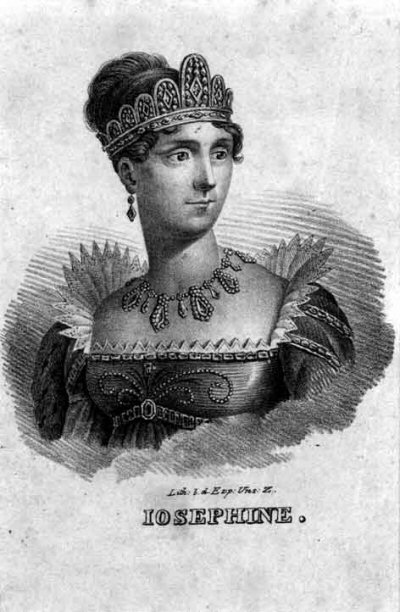The directory «Plots of stamps in the catalogue»
Beauharnais Josephine
(1763—1814)

Life was a roller coaster ride for the beautiful Josephine. Born in the West Indies on Martinique as Marie-Rose de Tascher de la Pagerie, she was raised on a slave plantation. Her family was never wealthy but married into nobility and had two children by Vicomte Alexandre Beauharnais, Eugene and Hortense. The marriage was not a happy one, mainly due to his womanising and unhappiness about her colonial gaucheness, although after separating the pair were reasonable friends. A quick learner, Josephine adopted many sophisticated ways and eventually became one of the leading lights in Paris society. Her life was shattered by the French Revolution, which saw her imprisoned. She survived the Terror, although her husband was executed. A socialite without equal, Josephine was mistress to several leading political figures and left a young General Napoleon Bonaparte completely smitten on their first meeting. Napoleon nicknamed Rose "Josephine" and her sexual experience fired the general's passions. They married in 1796 and while Bonaparte was a fine stepfather to her children, Josephine had regular dalliances with other men, in particular Hippolyte Charles - a dashing young officer who may have been her only true love. Her affairs almost led to divorce, however, a furious Bonaparte was persuaded to ignore her indiscretions on the grounds a stable marriage was necessary for his political ambitions. Josephine also aided Bonaparte's bid for power with a deft social and political touch that smoothed opposition and allowed him to become First Consul. After that the couple's marriage became a loving partnership, although never again was she able to take Napoleon's love for granted and so remained loyal to him. His series of lovers - regarded as a payback for her earlier lack of loyalty - hurt her deeply but her need for financial security overrode any other concerns. Eventually - and despite Bonaparte's love for her - the emperor's need for children of his own to secure succession to the crown saw him divorce her in 1809. Painful though it was, divorce allowed Josephine to devote time to gardens and her love of botany and her last years at Malmaison were productive. She died in 1814, a woman much loved by the people. Bonaparte never got over having to divorce her and his last words were: "France, the army, Josephine."
Ajman, 1971, Josephine
Ajman, 1973, Napoleon and Josephine
Ajman, 1973, Napoleon and Josephine
Cameroon, 1969, Coronation of Napoleon
Cuba, 1969, Napoleon planning the coronation
Ecuador, 1989, French Revolution
France, 1973, Coronation of Napoleon
Fujeira, 1972, Josephine
Gambia, 1993, The Coronation of Napoleon (detail)
Guinea, 2012, Paintings of 1812
Guyana, 1993, Coronation of Napoleon
Manama, 1972, Memory of Malmaison
Paraguay, 1971, Josephine
Ras al-Khaima, 1970, Josephine
Ras al-Khaima, 1970, Proclamation of the Empire at Saint-Cloud
Ras al-Khaima, 1970, Coronation of Napoleon
Ras al-Khaima, 1970, Coronation of Napoleon
Rwanda, 1975, Empresse Josephine
Sharjah, 1972, Napoleon as an Uncle. Memory of Malmaison
St. Lucia, 1969, Napoleon and Josephine
St. Lucia, 1969, Napoleon and Josephine
St. Lucia, 1969, Napoleon and Josephine
St. Lucia, 1969, Napoleon and Josephine
Umm al Quiwain, 1972, Coronation of Napoleon
Yemen (Kindom), 1970, Josephine. Napoleon as First Consul
France, 1963.10.12,  Amiens. Josephina
Amiens. Josephina
German Federal Republic, 2004.04.24—25,  Coblenz. Napoleon and Josephine
Coblenz. Napoleon and Josephine
France, 2003,  Fontainebleau, Josephine's bedroom
Fontainebleau, Josephine's bedroom